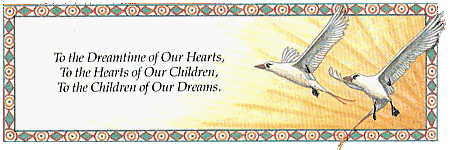



In October 1992, we went to Australia to research Baru Bay, our second children's book and audio cassette tape. Loaded with camera and dat recording equipment, we stepped off the plane to begin an experience that influences our lives to this day. We dove the Great Barrier Reef and were amazed at the beauty and diversity of marine life. We walked deserted, pristine beaches. We hiked through rainforests to record the sounds as they change at dawn and dusk. We stayed with Mandawuy Yunupingu, leader of the Aboriginal rock band Yothu Yindi, in the Gumatj community outside of Nhulunbuy where we enjoyed their warm friendship and generosity.
But beneath this finish of beauty we saw devastation and social problems. The reef near shore was being smothered by siltation from the dirt road that ran through the forest above the beach. Parts of the reef off shore were being smothered daily by large numbers of tourists. On private land, the rainforests were being burned to make way for more cattle pastures and agriculture. ln the Aboriginal community, their culture was being threatened by serious social problems, such as racism, alcoholism, drug abuse, and the disenfranchisement of their youth. We saw that all of these problems were caused by adults, not children.
In writing for children, we look through our eyes as children. We show the beauty of life so that when they grow older they will want to save this beauty for both themselves and their children. In reading and listening to Baru Bay, we want children to be filled with the wonder of life in and around a coral reef, the excitement of adventure, and the joy of new experiences. We want them to learn the value of unity, of staying together. We want to reinforce their innate understanding that there is no difference between people who are black and those who are white. The story, pictures and sounds are all based upon reality and are woven together to encourage the child's imagination.
![]() However, we cannot wait for our children to grow up to help this Earth.
The problem is now. Upon our return to San Francisco, we helped to form
a non-profit educational organization called Coral Forest which is
dedicated to the preservation of healthy coral reef ecosystems and the
protection of indigenous and traditional coastal cultures. We have also
stayed in contact with Mandawuy and his community and have raised funds
for the building of their cultural center. In addition, a portion of
the proceeds from the sale of Baru Bay will be used to benefit Coral
Forest and the Yothu Yindi Foundation.
However, we cannot wait for our children to grow up to help this Earth.
The problem is now. Upon our return to San Francisco, we helped to form
a non-profit educational organization called Coral Forest which is
dedicated to the preservation of healthy coral reef ecosystems and the
protection of indigenous and traditional coastal cultures. We have also
stayed in contact with Mandawuy and his community and have raised funds
for the building of their cultural center. In addition, a portion of
the proceeds from the sale of Baru Bay will be used to benefit Coral
Forest and the Yothu Yindi Foundation.
We do all this in hopes that one day the world as seen through the eyes of children will be the real world. Please join us.
Sincerely,


![]() Ocean Planet Exhibition Floorplan
Ocean Planet Exhibition Floorplan